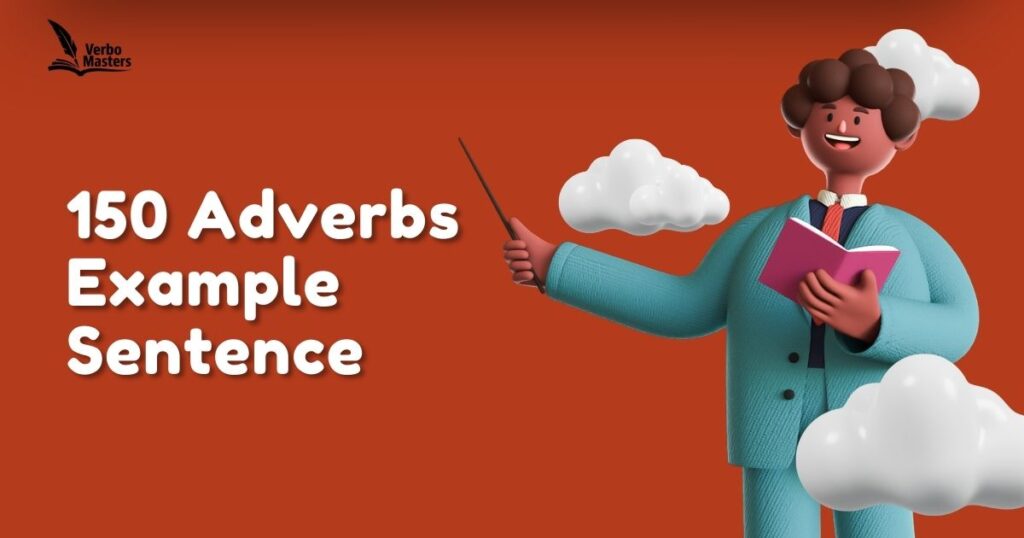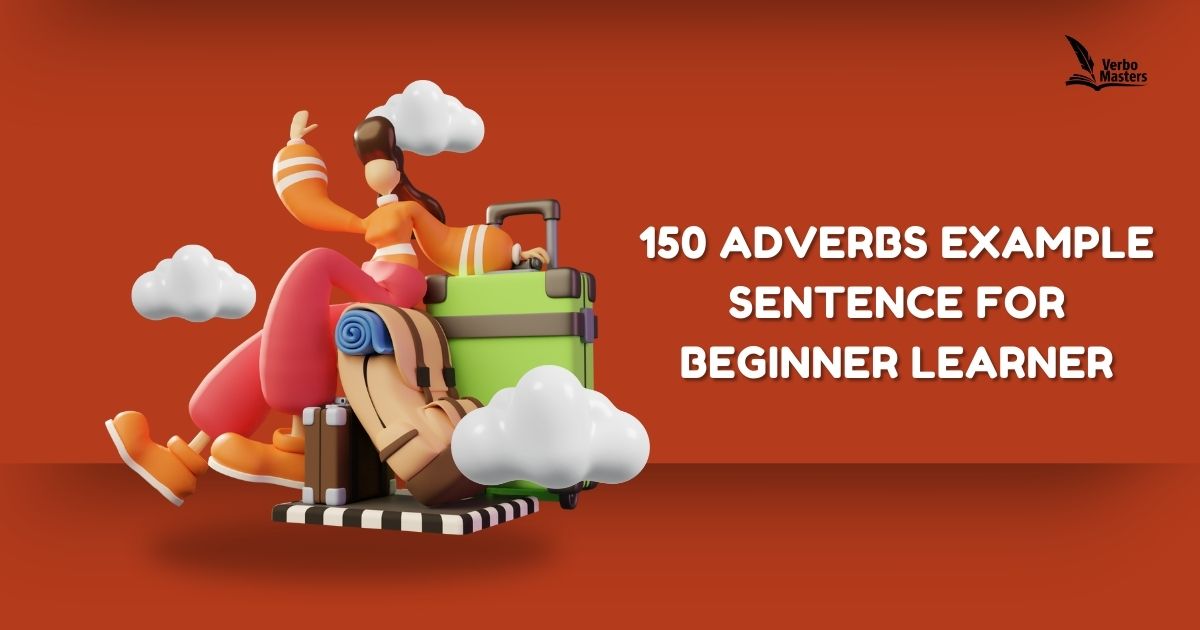Adverbs are words that modify or describe verbs, adjectives, or other adverbs, providing more detail about how, when, where, or to what extent something happens. They are essential for making sentences more informative and precise. For beginners, understanding adverbs can improve both writing and speaking skills. Adverbs help clarify actions, making your message clearer and more interesting.
Some common adverbs include words like “quickly,” “softly,” and “always.” With a wide range of adverbs available, they are important for expressing various ideas in a more engaging way. In this guide, we’ll explore 150 examples of adverbs to help you get comfortable using them in everyday sentences. Let’s dive into the world of adverbs and see how they can enhance your communication!
You can also read; Road Sign List with Their Names
150 Adverbs Example Sentence

150 adverbs with example sentences:
- Quickly – She ran quickly to catch the bus.
- Slowly – He walked slowly through the park.
- Carefully – Please handle the glass carefully.
- Easily – She solved the puzzle easily.
- Loudly – The music played loudly at the party.
- Softly – The baby cried softly in the crib.
- Happily – He smiled happily after receiving the gift.
- Sadly – She waved sadly as the train left.
- Quietly – He entered the room quietly to avoid waking anyone.
- Rarely – I rarely eat fast food.
- Always – She always arrives early to class.
- Never – They never go to bed late.
- Usually – I usually walk to school.
- Sometimes – He sometimes forgets his homework.
- Seldom – She seldom visits the beach.
- Frequently – We frequently go out to dinner.
- Totally – I totally agree with you.
- Completely – She completely forgot about the meeting.
- Partially – The door was partially open.
- Nearly – He nearly missed the train.
- Almost – The cup is almost full.
- Exactly – He is exactly what I expected.
- Virtually – The problem is virtually solved.
- Truly – She truly loves her work.
- Unusually – It is unusually cold today.
- Mostly – I mostly read books at night.
- Totally – I totally forgot it was your birthday!
- Frequently – He frequently visits his grandparents.
- Occasionally – We occasionally eat dessert after dinner.
- Uncommonly – The weather is uncommonly warm for this time of year.
- Barely – I barely made it to the meeting on time.
- Perfectly – The cake turned out perfectly.
- Smoothly – The project went smoothly after the meeting.
- Gratefully – She thanked him gratefully for the help.
- Thankfully – Thankfully, the rain stopped before the event.
- Finally – He finally finished the book.
- Soon – We will arrive soon.
- Before – She had never seen this before.
- After – The team celebrated after the match.
- Earlier – I saw him earlier today.
- Later – We can discuss this later.
- Now – I need to speak with you now.
- Then – He left the room, and then came back.
- Yesterday – I went shopping yesterday.
- Today – I have a meeting today.
- Tomorrow – They are leaving tomorrow.
- Constantly – He is constantly checking his phone.
- Periodically – The lights flicker periodically.
- Instantly – He answered the question instantly.
- Immediately – She left the room immediately after the bell rang.
- Gradually – The sky gradually darkened as night fell.
- Temporarily – I am temporarily staying with a friend.
- Permanently – They moved permanently to a new city.
- Tremendously – She was tremendously successful in her career.
- Extremely – The movie was extremely exciting.
- Highly – He is highly recommended for the job.
- Very – She is very talented.
- Moderately – The test was moderately difficult.
- Fairly – The task was fairly easy to complete.
- Somewhat – The cake was somewhat dry.
- Lightly – She lightly touched his shoulder.
- Heavily – The rain fell heavily all night.
- Strongly – I strongly believe in your abilities.
- Weakly – She spoke weakly during the presentation.
- Energetically – He works energetically every day.
- Effortlessly – She passed the exam effortlessly.
- With ease – He finished the puzzle with ease.
- Elegantly – She danced elegantly at the gala.
- Nervously – He spoke nervously during his interview.
- Confidently – She answered the questions confidently.
- Kindly – He spoke kindly to the elderly woman.
- Harshly – The teacher spoke harshly to the students.
- Gently – She patted the puppy gently.
- Aggressively – The dog barked aggressively at strangers.
- Politely – She greeted everyone politely.
- Rudely – He was rudely interrupting the speaker.
- Cheerfully – She greeted everyone cheerfully.
- Carelessly – He carelessly dropped his phone.
- Cautiously – She stepped cautiously on the ice.
- Thoughtfully – He gave the gift thoughtfully.
- Outwardly – Outwardly, she seemed calm.
- Inwardly – Inwardly, he was worried.
- Mentally – She was mentally prepared for the test.
- Physically – She was physically tired after the workout.
- Visually – The house was visually stunning.
- Audibly – He was audibly upset after the news.
- Logically – She explained the problem logically.
- Creatively – He solved the issue creatively.
- Intellectually – The book challenged me intellectually.
- Emotionally – The movie was emotionally moving.
- Spiritually – He felt spiritually connected to nature.
- Romantically – He treated her romantically on their anniversary.
- Eagerly – She waited eagerly for the results.
- Reluctantly – He reluctantly agreed to help.
- Willingly – She willingly volunteered to help.
- Hastily – He packed his bag hastily.
- Leisurely – They walked leisurely through the park.
- Fiercely – The tiger roared fiercely.
- Visibly – He was visibly upset after the argument.
- Simultaneously – The two events happened simultaneously.
- Deliberately – She smiled deliberately to cheer him up.
- Unintentionally – I unintentionally hurt her feelings.
- Unknowingly – He unknowingly stepped on her foot.
- Knowingly – She nodded knowingly.
- Accidentally – He broke the glass accidentally.
- Intentionally – She intentionally made the decision.
- Openly – He openly discussed his feelings.
- Secretly – She secretly planned a surprise party.
- Publicly – He praised her publicly.
- Privately – She talked to him privately.
- Honestly – I honestly don’t know the answer.
- Dishonestly – He dishonestly claimed to finish the project.
- Frequently – I frequently go for runs.
- Infrequently – We meet infrequently for coffee.
- Temporarily – The library is temporarily closed.
- Permanently – She has permanently moved to another city.
- Regularly – I regularly exercise in the mornings.
- Occasionally – We occasionally dine out on weekends.
- Continuously – The machine runs continuously.
- Intermittently – The lights flicker intermittently.
- Roughly – The car hit the wall roughly.
- Smoothly – The conversation went smoothly.
- Fast – He runs fast in races.
- Slow – She walked slow through the park.
- Dramatically – The movie ended dramatically.
- Faintly – She smiled faintly.
- Brightly – The sun shone brightly in the sky.
- Dimly – The room was dimly lit.
- Eagerly – She awaited the results eagerly.
- Reluctantly – He agreed reluctantly to help.
- Willingly – She volunteered willingly for the task.
- Cheerfully – They greeted everyone cheerfully.
- Generously – He donated generously to the charity.
- Harshly – The teacher reprimanded him harshly.
- Judgmentally – She looked at him judgmentally.
- Gently – She touched the kitten gently.
- Quickly – She answered the question quickly.
- Suddenly – Suddenly, the lights went out.
- Unknowingly – He unknowingly insulted her.
- Unpredictably – The weather changes unpredictably here.
- Incredibly – The performance was incredibly good.
- Exceptionally – She is an exceptionally talented singer.
- Remarkably – The child remarkably remembered all the details.
- Surprisingly – He surprisingly passed the test.
- Seriously – They took the news seriously.
- Casually – She dresses casually for the party.
- Playfully – The dog ran playfully around the yard.
- Naturally – He was naturally good at sports.
- Unusually – The weather is unusually warm today.
- Delicately – She spoke delicately about the situation.
These examples will help you understand how adverbs work in sentences, making communication clearer and more interesting!
FAQ’s
What are adverbs?
Adverbs are words that modify or describe verbs, adjectives, or other adverbs. They provide more detail about how, when, where, or to what extent an action occurs.
How do adverbs modify verbs?
Adverbs modify verbs by providing additional information about the action. For example, in the sentence “She runs quickly,” the adverb “quickly” tells us how she runs.
Can adverbs modify adjectives?
Yes, adverbs can modify adjectives. For instance, in “She is very tall,” the adverb “very” modifies the adjective “tall,” intensifying the description.
What types of adverbs are there?
There are several types of adverbs, including adverbs of manner (e.g., quickly, carefully), adverbs of time (e.g., now, always), adverbs of place (e.g., here, everywhere), and adverbs of frequency (e.g., always, rarely).
How do adverbs of time work?
Adverbs of time indicate when something happens. Words like “now,” “today,” “soon,” and “yesterday” are all examples of adverbs that express time.
What are adverbs of frequency?
Adverbs of frequency describe how often something happens. Examples include “always,” “never,” “frequently,” and “occasionally.”
Can an adverb modify another adverb?
Yes, adverbs can modify other adverbs. For example, in “She runs very quickly,” the adverb “very” modifies the adverb “quickly,” intensifying how fast she runs.
What is the difference between an adjective and an adverb?
An adjective modifies a noun, while an adverb modifies a verb, adjective, or another adverb. For example, “She is a good runner” (adjective) vs. “She runs quickly” (adverb).
Are all adverbs end in “-ly”?
Many adverbs do end in “-ly” (e.g., quickly, softly), but not all. Some adverbs, like “well,” “fast,” or “hard,” do not have the “-ly” suffix.
Can adverbs be used in different positions in a sentence?
Yes, adverbs can appear in different positions. They may be placed at the beginning, middle, or end of a sentence, depending on what is being modified or emphasized.
Conclusion
Adverbs play a crucial role in making sentences more descriptive and clear. They provide important details about how, when, where, and to what extent actions occur. For example, by adding an adverb like “quickly,” you can explain how someone performs an action. This helps listeners or readers better understand the specifics of what’s happening.
Learning to use adverbs effectively enhances communication, making it more vivid and precise. They allow speakers and writers to express emotions, intentions, and actions in greater depth. By practicing with different types of adverbs, you can improve your language skills and make your sentences more interesting and informative.

I’m John Smith, a language enthusiast dedicated to helping writers, students, and professionals master the art of clear and effective communication. Whether you’re looking for grammar tips, writing guides, or common mistake corrections, you’ll find valuable insights to improve your language skills. Let’s make grammar simple and fun!

